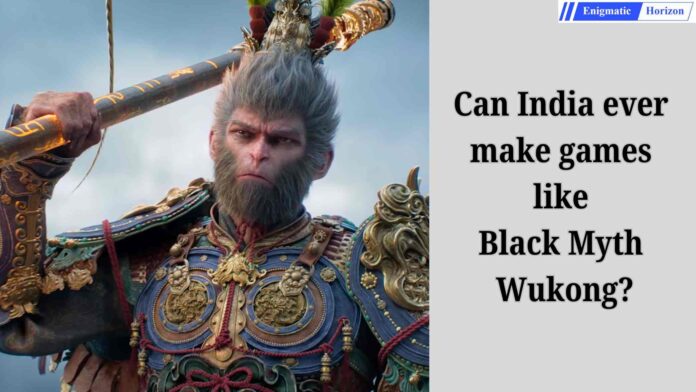Despite having a large film industry that spends millions on movies each year, why has India not been able to create big budget AAA games like Black Myth Wukong
Nirjher Kumar Patel
(Update: The trailer for Age of Bhaarat has released- India’s first AAA game, which seems to be inspired by games like Black Myth Wukong and Elden Ring)
India’s gaming industry has seen significant growth with games like Raji and Kamla, but the country has yet to produce AAA games like Black Myth: Wukong, a recently released Chinese game, which has gained huge popularity and appreciation, crossing 20 million sales in less than 2 months! Though it is the first AAA game ever made by the studio Game Science, it has received unparallel success in a short time.
This brings us to our question- despite talent and potential, and having vast history and literature, why is Indian not able to make a AAA game like Black Myth Wukong. Well, several challenges hinder the development of such large-scale, high-quality games in our country. Here are five key reasons why:
1. Piracy
In a country where many still struggle with poverty and lack of access to education, entertainment is often a lower priority. As a result, even among those who play PC and console games, many resort to pirated versions of games instead of purchasing them legally. This widespread piracy leads to significant revenue losses, especially for newer and smaller studios, making it risky for investors to fund high-quality projects.
For example, Raji: An Ancient Epic, developed by Nodding Heads Games, which is the first game made in India based on Hindu mythology, received a lot of appreciation from critics and players, and yet, it faced heavy piracy. This not only hurts sales but also discouraged further investment, reducing the chances of developing AAA titles in the future. Stronger enforcement of intellectual property rights is needed to curb piracy and support the growth of the gaming sector, especially when it comes to indie games.
2. Gaming Seen as a “Phase” for Teenagers
In India, gaming is often viewed as a distraction for children or teenagers rather than a legitimate form of entertainment for all ages. Media coverage tends to focus on the negative aspects, such as addiction or screen time, without acknowledging the positive elements like brain development, improved focus, etc.
Well, perceptions are definitely changing slowly, and yet there’s still a long way to go before gaming is widely accepted as a serious, multifaceted hobby or career.

3. Lack of Funding and Talent Drain
Indian game studios often face financial limitations, making it difficult to develop large-scale games. Unlike countries like China, where companies like Tencent have massive resources, Indian developers typically rely on self-funding or limited venture capital.
Additionally, many talented developers leave India for better opportunities abroad, which further weakens the local industry. This talent drain makes it harder to innovate and compete globally. Retaining skilled developers is crucial to building a strong local gaming ecosystem.
It is not that India lacks talents in the gaming sector, because if you look at the end-game credits of popular AAA titles, you will see many Indian names!
4. Limited Experience in AAA Development
Most Indian studios focus on mobile or indie games due to smaller budgets and limited infrastructure. While these games have had some success, the lack of experience in AAA game development shows in the quality and scale of these local projects.
To create AAA games, Indian developers need more funding, mentorship, and possibly collaboration with experienced international studios. Without this, local games will continue to fall short of international standards.
5. Intense International Competition
The international gaming market is highly competitive, with established franchises like Call of Duty and Elden Ring, taking most of the attention. Despite having a huge cultural heritage, vast history as well as mythological stories, it is sad that we have not been able to produce titles like Ghost of Tsushima and Elden Ring.
From the epic tales of the Mahabharata and Ramayana to the stories of historical figures like Chandragupta Maurya, Ashoka, and Chatrapati Shivaji, there is no shortage of legendary narratives that could captivate an international audience.

To compete on an international level, Indian developers must create unique, high-quality experiences and find ways to capture the essence of Indian culture in a way that can attract international players. This will require not only innovation but also effective marketing strategies to capture attention in an already oversaturated market.
While India has seen success in mobile and few indie games, the development of AAA titles faces challenges like piracy, lack of funding, talent drain, and intense competition. By improving infrastructure, fostering talent, and addressing these obstacles, India definitely has the potential to make its mark in the gaming industry. The success of Black Myth Wukong, which is based on Chinese culture, makes it obvious that it is not that hard to succeed if you put in hard work and determination!
If you are a PC gamer, read here to know why PC gamers in 2025 are preferring the NVIDIA RTX 5090 graphics card.
